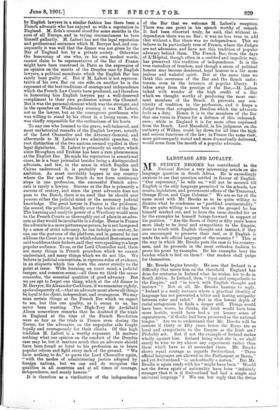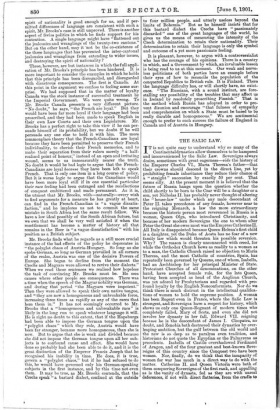LANGUAGE AND LOYALTY.
MR. SYDNEY BROOKS has contributed to the National Review a very interesting article on the language question in South Africa. He is exceedingly anxious to see that question settled in favour of English. "Our supremacy," he tells us, "will not be assured till English is the only language permitted - in the schools, law courts, legislature, and government offices of the Transvaal, Orange River, and Cape Colonies." We are so far of the same mind with Mr. Brooks as to be quite willing to dismiss what he condemns is "purblind sentimentality." We are quite willing to meet him on the ground he has himself marked out, and to have the issue decided for us by the examples he himself brings forward in support of his position. "Are the Boers of thirty or fifty years hence more likely to be loyal and sympathetic to the Empire, more in touch with English thought and instinct, if they are encouraged to preserve their taal, or if English is made the sole official language of the country ? " This is the way in which Mr. Brooks puts the case to his country- men, and he proceeds in the most orthodox fashion to prove his point by examples. Do his examples bear the burden which is laid on them ? Our readers shall 'judge for themselves.
Mr. Brooks begins bravely. He sees that Ireland is a difficulty that meets him on the threshold. England has done for centuries in Ireland what he wishes her to do in South Africa. Is Ireland, then, "loyal and sympathetic to the Empire," and "in touch with English thought and instinct " ? Not at all, Mr. Brooks hastens to reply. "Ireland is a ready instance where a practical identity of language has not prevented a bitter and lasting antipathy between ruler and ruled." But in this lowest depth of racial antagonism he finds a deeper still. Things would have been worse, he thinks, the Irish would have been more hostile, would have had a yet keener sense of separateness, "if Gaelic had been preserved as the national tongue." Are we to understand that Mr. Brooks will be content if thirty or fifty years hence the Boers are as loyal and sympathetic to the Empire as the Irish are? Probably not. But if not the example of Ireland makes wholly against him. Ireland being what she is, we shall surely be wise to try almost any experiment rather than those which have so ill succeeded there. Mr. Brooks shows equal courage as regards Switzerland. "Three official la,nguriges are allowed in the Parliament at Berne," and yet Switzerland "is undoubtedly a nation." But Mr. Brooks is again ready with his "might have been." Would not the Swiss spirit of nationality have been "infinitely stronger than it is if Switzerland had had a single and universal language " ? We can but reply that the Swiss spirit of nationality is good enough for us, and if per- mitted differences of language are consistent with such a spirit, Mr. Brooks's case is still unproved. There is another aspect of Swiss politics in which he finds support for his contention. A single language might have "flattened out the jealousies and wranglings of the twenty-two .cantons." But on the other hand, may it not be the co-existence of the three languages that has prevented the inter-cantonal jealousies and wranglings from extending to wider issues, and destroying the spirit of nationality ?
These, however, are but instances in which the full appli- cation of Mr. Brooks's principle has been hindered. It is more important to consider the examples in which he holds that this principle has been disregarded, and disregarded with disastrous consequences. The first is Canada. At this point in the argument we confess to feeling some sur- prise. We had supposed that in the matter of loyalty Canada was the stock instance of successful treatment by the Imperial Government. We were quite wrong. To Mr. Brooks Canada presents a very different picture. "No doubt," he says, "the French are loyal." But they would have been far more loyal if their language had been proscribed, and they had been made to speak English in their own Law Courts and their own Legislature. Mr. Brooks has a perfect right to take this view if he can per- suade himself of its probability, but we doubt if he will persuade any one else to hold it with him. The more commonplace theory that the French-Canadians are loyal because they have been permitted to preserve their French individuality, to cherish their French memories, and to make their separation from their rulers merely "a half- realised point of honour," instead of an open and irritating wound, seems to us immeasurably nearer the truth. No doubt it would be bad logic to argue that the French- Canadians are loyal because they have been left to speak French. That is only one item in a long course of policy. But it is worse logic to argue that the Canadians would have been more loyal still if in one essential particular their race feeling had been outraged and the recollections of conquest embittered and made permanent. As it is, the utmost that Mr. Brooks, with—naturally—every wish to find arguments for a measure he has greatly at heart, can find in the French-Canadian is "a vague dissatis- faction," and he implores us not to commit the same mistake in South Africa lest the same result follow. We have a low ideal possibly of the South African future, but we own that we shall be very well satisfied if when the resettlement has become a matter of history all that remains in the Boer is "a vague dissatisfaction" with his position as a British subject.
Mr. Brooks finds what he regards as a still more crucial instance of the bad effects of the policy he deprecates in "the polyglot chaos of Austria-Hungary. So long as she spoke German, so long as German prevailed in all corners of the realm, Austria was one of the decisive Powers of Europe. She began to decline from the moment the Czechs and Magyars were allowed to revive their dialects." When we read these sentences we realised how hopeless the task of convincing Mr. Brooks must be. He sees causes where other people see consequences. There was a time when the speech of the Magyar nobility was German, and during that period "the Magyars were impotent." Then they were allowed to speak their own native tongue, and "they are now a homogeneous and unbreakable force, increasing three times as rapidly as any of the raees that hem them in." It has not seemingly occurred to Mr. Brooks that a "homogeneous and unbreakable race" is likely in the long run to speak whatever language it will. He is right no doubt to this extent, that if the Hapsburgs had been able to impose the German tongue upon the "polyglot chaos" which they rule, Austria would have been far stronger, because more homogeneous, than she is now. But to argue that she is weak and divided because she did not impose the German tongue upon all her sub- jects is to confound cause and effect. She would have done so probably had she been able to do it, and it is the great distinction of the Emperor Francis Joseph that he recognised his inability in time. He does, it is true, govern a "polyglot chaos," but if he had refused to do this, he would have governed only his German-speaking subjects in the first instance, and by this time not even them. It may be true, as Mr. Brooks contends that the Czechs speak "a bastard dialect, confined at the outside to four million people, and utterly useless beyond the limits of Bohemia.' But as he himself insists that for this bastard dialect the Czechs have "passionately discarded" one of the great languages of the world, he gives us the means of measuring the intensity of the Czech determination to retain their nationality. Their determination to retain their language is only the symbol and outcome of a yet more passionate feeling.
It is pleasant, however, to argue with a controversialist who has the courage of his opinions. There is a country in which, and a Government by which, an invaluable lesson is being read to us at this moment. Our weak and nerve- less politicians of both parties have an example before their eyes of how to reconcile the population of the conquered Republics to British rule. It is Finland. There the language difficulty has, or will shortly have, no exist. ewe. "The Russians, with a sound instinct, are fore- stalling any possibility of the troubles that may affect us in Ireland by resolutely proscribing Finnish" That is the method which Russia has adopted in order to pre. vent disunion and encourage "that fulness of sympathy and comprehension on which a State must be based to be really durable and homogeneous." We are sentimental enough to prefer to such success the failure of England in Canada and of Austria in Hungary.







































 Previous page
Previous page